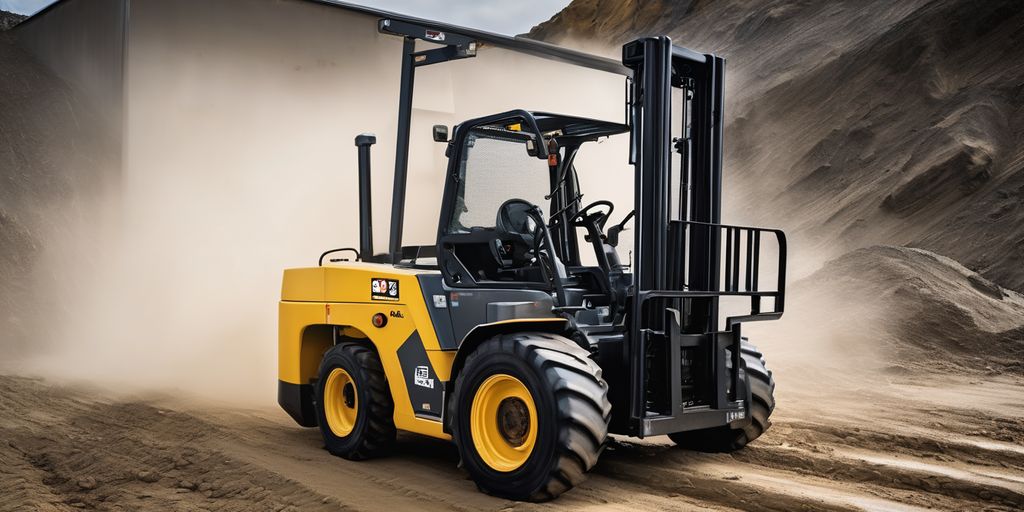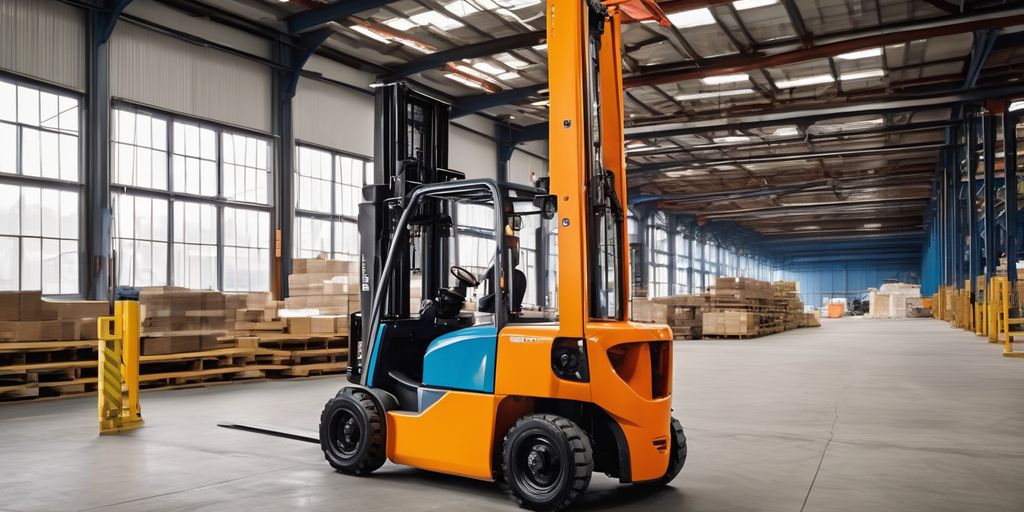Buying a used forklift can be a smart way to save money, but it comes with its own set of challenges. Whether you're a small business or a large warehouse, understanding what to look for in a used forklift is key to making a good investment. This guide will walk you through the most important factors to consider when evaluating used forklifts, helping you make an informed decision.
Key Takeaways
- Always inspect the forklift for visible damage and review its maintenance records.
- Compare the costs of used forklifts with new ones, and consider long-term maintenance expenses.
- Check the forklift's age, hours of operation, and previous workloads to gauge its reliability.
- Look into warranty options and after-sales support to protect your investment.
- Ensure the forklift meets your specific operational needs and future requirements.
Inspecting the Condition of the Forklift
A comprehensive inspection is crucial to ensure the forklift is in good condition. This includes examining the engine, hydraulics, tires, brakes, and mast. Request maintenance records to gauge how well the forklift has been cared for in the past.
Understanding the Cost Implications
When buying a used forklift, it's crucial to understand the cost implications. Used forklifts are more budget-friendly compared to new ones, allowing you to save money on your equipment investment. However, it's important to look beyond the initial purchase price and consider the total cost of ownership, including maintenance, repairs, fuel, and parts availability. This holistic view helps you make a more informed decision.
Comparing Prices with New Forklifts
When comparing the cost between used and new forklifts, it's important to consider that used forklifts are generally more affordable upfront but may incur higher maintenance costs over time. New forklifts tend to have a higher initial price tag but come with warranties and may be more reliable in the long run. Here are some key points to keep in mind:
- Used Forklifts:
- Cost less initially
- May require more repairs and maintenance
- New Forklifts:
- Higher initial cost
- Come with warranties
- Generally more reliable
Evaluating Long-Term Maintenance Costs
One of the biggest reasons people choose to buy a used forklift truck is the significant cost savings compared to investing in a brand-new model. However, it's essential to consider the long-term maintenance costs. Regular servicing indicates that the equipment has been well-maintained and is less likely to have underlying issues. When calculating downtime expenses, add up the average price of parts and service for each forklift.
Considering Financing Options
Financing options can also play a significant role in your decision. Some sellers offer financing plans that can make the purchase more manageable. It's worth exploring these options to see if they align with your budget and financial goals. Remember, while cost-saving is important, compromising on quality may lead to escalated maintenance costs in the long run. Prioritize thorough inspections and seek guidance from reputable sellers or technicians to ensure a wise investment in the best-used forklift suited to your operational needs.
Evaluating the Forklift's Usage History
When buying a used forklift, digging into its history is paramount. This due diligence can spare you from costly downtime and hefty repair bills.
Determining the Age of the Forklift
Knowing the age of the forklift helps you estimate its remaining useful life. Older forklifts might have more wear and tear, affecting their reliability and performance.
Analyzing the Hours of Operation
It's crucial to check a used forklift's odometer reading. The number of hours on it can give you a rough estimate of how long it'll last after you purchase it. If you notice lots of wear on the main components and the body, but the odometer shows a low reading, the previous owner may have tampered with the odometer.
Reviewing Past Applications and Workloads
Understanding where and how the forklift was used can reveal potential issues. For example, forklifts used near saltwater may have more corrosion, while those in humid environments might have electrical problems. Reviewing the service history can also tell you if there were any recurring service issues or extensive operator misuse.
Understanding forklift useful life is crucial for businesses to maximize their investment and avoid costly surprises.
Assessing Warranty and Support Options
When buying a used forklift, it's crucial to understand the warranty that comes with it. Most forklift dealers offer warranties to cover repairs for a specific period after purchase. This warranty can vary from 1 to 5 years, depending on the dealer.
Checking for Existing Warranties
Always check if the forklift comes with a warranty. Some dealers offer a basic 30-day warranty, while others might provide an extended 1-year warranty. Knowing the details of the warranty can save you from unexpected costs.
Exploring Extended Warranty Options
Ask if an extended warranty is available. Extended warranties can offer additional protection and peace of mind. For example, some dealers provide options that extend the warranty for an extra year or more, covering specific components.
Evaluating After-Sales Support
After-sales support is another important factor. Good support can include regular maintenance, availability of spare parts, and prompt service. Make sure the dealer offers reliable after-sales support to keep your forklift in good working condition.
Considering the Resale Value
When buying a used forklift, it's important to think about its potential resale value. New forklifts depreciate quickly, so understanding how long you plan to keep the forklift can help you make a better decision.
Factors Affecting Resale Value
Several factors can impact the resale value of a forklift:
- Age: Older forklifts generally have a lower resale value.
- Condition: Well-maintained forklifts fetch higher prices.
- Brand: Some brands hold their value better than others.
- Usage: Forklifts with fewer hours of operation are more valuable.
Timing Your Purchase and Sale
Timing can play a crucial role in maximizing resale value. Buying during off-peak seasons can save you money, while selling during high demand periods can increase your returns.
Maximizing Resale Potential
To get the best resale value, keep up with regular maintenance and document all repairs. This not only ensures the forklift runs smoothly but also makes it more attractive to future buyers.
Remember, the fair value of a forklift, whether new or used, is determined by its market price based on factors like age, condition, maintenance history, and brand.
Ensuring the Forklift Meets Your Needs
Before you start looking for a used forklift, it's important to identify your operational requirements. Think about things like how much weight the forklift needs to lift, how high it needs to go, and whether you'll be using it indoors or outdoors. This will help you find the right forklift for your needs.
Next, make sure the forklift's specifications match the tasks you need it to do. For example, if you need to lift heavy loads, you'll need a forklift with a high load capacity. If you need to move things around in tight spaces, you'll need a forklift with a small turning radius.
Finally, plan for your future needs. Think about how your business might grow and change over time, and choose a forklift that can grow with you. This will help you avoid having to buy a new forklift in the near future.
Taking the time to ensure the forklift meets your needs will save you time and money in the long run.
Tips for a Successful Purchase

Choosing Reputable Sellers
When buying a used forklift, it's crucial to choose reputable sellers. Look for sellers with positive reviews and a good track record. This can help you avoid potential scams and ensure you're getting a quality product. Additionally, ask for the maintenance history: a well-documented maintenance history is a good sign that the forklift has been well cared for.
Conducting Thorough Inspections
Before finalizing your purchase, conduct a thorough inspection of the forklift. Check for any visible damage and ensure all parts are in working order. It's also a good idea to perform an operational test to see how the forklift handles under normal working conditions. This step can help you identify any potential issues that might not be immediately apparent.
Negotiating the Best Deal
Don't be afraid to negotiate the price. Compare prices with other sellers and use this information to your advantage. Remember, the goal is to get the best value for your investment. Be prepared to walk away if the deal doesn't meet your expectations. Sometimes, showing that you're willing to walk away can lead to a better offer from the seller.
A thoughtful approach is essential to ensure a smooth acquisition process and to make sure you’re getting the best value for your investment.
Conclusion
Buying a used forklift can be a smart way to save money while still getting a reliable machine. However, it's important to do your homework. Always check the forklift for any damage and make sure it has been well taken care of. Ask about its history and how many hours it has been used. Don't forget to think about future costs, like maintenance and repairs. By paying attention to these details, you can find a used forklift that meets your needs and fits your budget.
Frequently Asked Questions
What should I look for when inspecting a used forklift?
When inspecting a used forklift, check for visible damage, review the maintenance records, and assess its operational efficiency. Make sure it runs smoothly and all parts are in good working order.
How do used forklifts compare in price to new ones?
Used forklifts are generally cheaper than new ones. However, it's important to consider the long-term maintenance costs and potential need for repairs.
Why is the forklift's usage history important?
The usage history helps you understand the age of the forklift, its hours of operation, and the types of tasks it has handled. This information can give you an idea of how much life is left in the machine.
What warranty options are available for used forklifts?
Some used forklifts come with existing warranties. You can also explore extended warranty options for added protection. Always check what kind of after-sales support is available.
How can I ensure the forklift meets my needs?
Identify your operational requirements and match them with the forklift's specifications. Consider what tasks you'll be using it for and plan for any future needs.
What are some tips for buying a used forklift?
Choose reputable sellers, conduct thorough inspections, and negotiate the best deal. Make sure to review all documentation and ask for a test run before making a decision.




Leave a comment
This site is protected by hCaptcha and the hCaptcha Privacy Policy and Terms of Service apply.